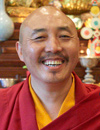
In the great perfection teachings it’s often said, “The more thoughts and kleshas that arise, the more wisdom will arise.” The reason for this is that if you have gained some stability in awareness, the arising of any thought or klesha will cause a commensurate arising of awareness. So, every upsurge of kleshas is actually a heightening of awareness. For example, we’re very, very afraid of our craving, our desire, and normally we feel pulled by it. We’re pulled by our attraction to pleasant things: everything we regard as pleasant, desirable, everything that we think we want. If instead of allowing yourself to be pulled by your desire, you don’t attempt to get rid of the desire, but you simply relax in it, you look to see where the desire came from, where the desire is while it is present, and where the desire goes, you won’t find anything. Not finding anything, you’ll realize that there’s nothing in desire you need to get rid of. You simply just have to not be pulled by it. And if you relax in it, it is the wisdom of discrimination. It is the Buddha Amitabha. That is the only way you can recognize the wisdom of discrimination, the nature of which is the Buddha Amitabha.
We are overpowered by our kleshas, but this is actually unnecessary. We are pulled by our attraction to what we think of as pleasant, pulled by our aggression, our anger, toward what we regard as threatening, but the mere presence of these kleshas does not require us to be pulled by them. If you relax in the klesha, such as when you get angry at someone and you feel anger, if you relax in that anger you don’t allow yourself to be pulled by it into action, you don’t attempt to chase the anger out of your mind, but you just relax in it, you’ll see that it’s wisdom. It’s the mirror-like wisdom. And this is very important in the practice of the great perfection. This is what we call “the stamping out the kleshas.” This is what makes the vajrayana a quick path for those of higher capacity, because we discover that the non-dual nature of what we think of as dirty and what we think of as clean.
When we are pulled-in by, or seduced by, our own kleshas, our own emotions, it’s because we mistake them to be real and substantial. When you recognize, through analysis, they are unreal and insubstantial, you realize they needn’t have any power over you. For example, when we get angry at someone, in some way we are identifying that person as our enemy. But the whole thing is unreal. The anger is unreal and the identification of the person as an enemy is unreal. Somebody who was your friend yesterday may be your enemy today, may be your friend again tomorrow. If these designations, these imputations, were real, then throughout beginningless time the same person would always be your enemy. But we know that’s not true. So all of our emotions are like that.
[From a teaching on Essence of Wisdom: Stages of the Path, Part 2 by Lama Tashi Topgyal. Translated by Lama Yeshe Gyamtso. Edited by Matt Willis. Teaching is available at the KPL Bookstore in both audio and video formats.]
